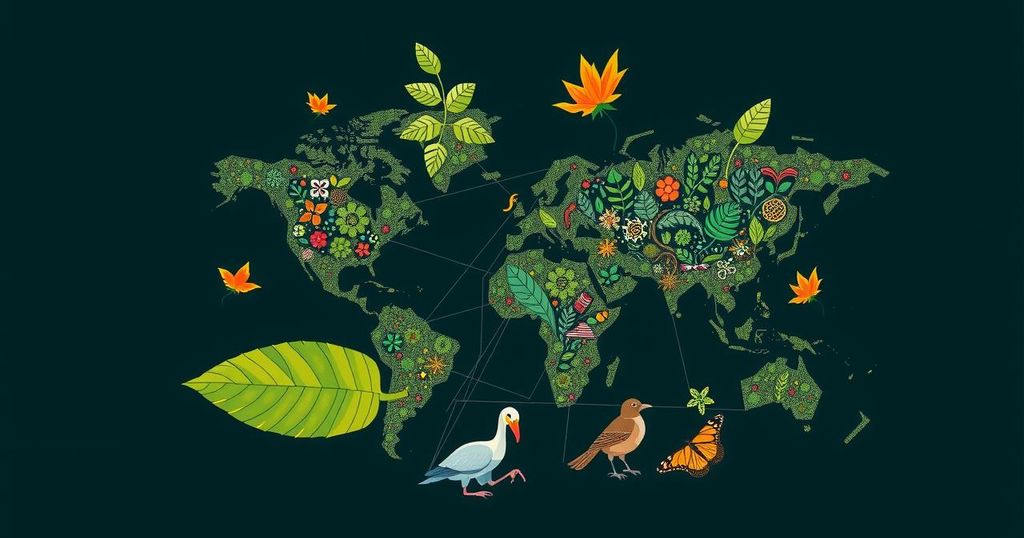Unified Action Required for Climate and Biodiversity at COP16
The COP16 to the CBD will be held from 21 October to 1 November 2024 in Cali, Colombia, focusing on the urgent connection between biodiversity loss and climate change. The IFAW emphasizes the importance of aligning global efforts to combat these crises, particularly regarding marine and coastal ecosystems. Matt Collis from IFAW stresses that healthy oceans are crucial for a sustainable planet. The event is expected to set a foundational tone for international environmental policies ahead of COP30.
The 16th Conference of the Parties (COP16) to the Convention on Biological Diversity (CBD) will take place from 21 October to 1 November 2024 in Cali, Colombia. During this significant gathering, world leaders and environmental specialists will convene to address the pressing issues of biodiversity loss and climate change, which are increasingly intertwined. The International Fund for Animal Welfare (IFAW) emphasizes the necessity for robust international collaboration to confront these dual crises. Matt Collis, IFAW’s Senior Director of Policy, highlighted the urgency of aligning efforts to address both climate change and biodiversity loss, stating that solutions for one cannot be achieved without confronting the other. COP16 presents a pivotal opportunity to establish foundational strategies for future environmental negotiations, especially as it precedes the United Nations Framework Convention on Climate Change (UNFCCC) COP30, where nations will revise their climate action plans. The 2023 COP28 Joint Statement on Climate, Nature, and People has reinforced the vital need for a unified approach to these issues. IFAW calls upon the participating parties at COP16 to ensure that these commitments are mirrored in the summit’s outcomes, particularly in the high-level engagements and the Cali Declaration. Furthermore, the preservation of marine and coastal biodiversity, crucial for sustaining both wildlife and human populations, must be a priority. Marine ecosystems are essential in climate regulation, acting as carbon sinks and stabilizing weather patterns, yet they face significant threats from human actions and climate change. Mr. Collis remarked on the critical role of healthy oceans, affirming, “Healthy oceans are the foundation of a healthy planet. They absorb carbon, mitigate climate impacts, and support rich biodiversity.” He urged that COP16 must focus on protecting marine ecosystems to continue delivering these vital environmental services amidst increasing climate stresses. He further expressed hope for COP16 to facilitate progress in tackling these interconnected crises, emphasizing that the future sustainability of our planet hinges on our collective actions during this meeting. IFAW will host an official side event titled “Leveraging wildlife conservation and rewilding to supercharge climate mitigation and adaptation” on 24 October at 16:30 COT, aimed at discussing the integral role that wildlife conservation plays in combating climate change. They will also unveil new guidelines to assist governments in integrating wildlife conservation into their climate strategies. For additional details on the event and the overall agenda for CBD COP16, one may refer to the IFAW website and CBD official pages.
The Convention on Biological Diversity (CBD) aims to preserve the natural variety of life on Earth, recognizing that biodiversity is essential for the stability of ecosystems. The upcoming COP16 is integral as it gathers global leaders to discuss the synergistic impacts of climate change on biodiversity and vice versa. Environmental experts stress that addressing climate change is essential not just for sustainable development but also for maintaining the resilience of ecosystems, particularly marine ones, which are facing unprecedented pressures from human activities and climate change. The coordination between biodiversity efforts and climate action is increasingly acknowledged as crucial for achieving long-term environmental goals.
In conclusion, the 16th Conference of the Parties to the CBD represents a critical juncture for global environmental management, urging comprehensive strategies that encompass biodiversity conservation alongside climate action. A unified response is imperative to address the dual challenges of climate change and biodiversity loss effectively. COP16 not only serves as a platform for pledges but also as an opportunity to implement actionable commitments that will influence future negotiations and the health of ecosystems worldwide.
Original Source: www.ifaw.org




Post Comment